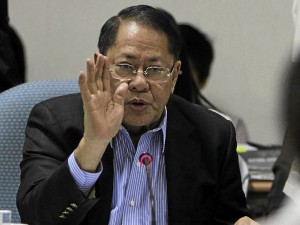PH must open up to global debate on economic ideas to improve policies—experts
MANILA, Philippines—An economic expert on Friday said that the Philippines must open itself to the global debate on economic ideas so that it could better expand and improve its economic policies.
“The Philippines has much to offer, the Philippines has much to hope for. But we need to open up the Philippines to the global discussion and debate,” John Nye, executive director of the Angara Centre for Law and Economic Policy, said during the Angara centre’s inaugural conference on globalization, innovation and economic growth.
Launched on August 3 and named after Senator Edgardo Angara, the Angara Centre for Law and Economics was described as the first and only Philippine policy and academic think-tank that commits itself to tapping internationally trained Filipino scholars and a wide network of international law and economic experts to uplift the Philippines’ standards of academic research and policy studies.
Nye, also the Frederic Bastiat Chair in Political Economy at the Mercatus Center of George Mason University, stressed that the new venture’s purpose was to promote discussions and debates on policies by highlighting the role of basic research and integrating Philippine work and ideas to the world network of ideas.
“To better understand policy, first we have to promote both basic research and a rigorous mindset that allow us to analyze policy questions within a self-critical and open framework,” Nye said.
Nye added that it was important for Filipinos to realize how ideas and debates that had been discussed globally have great relevance to the issues of their country.
“We want to show people here that there are systematic and consistent ways of discussing core ideas and we want to encourage more international experts to work on Philippine policy,” Nye said.
Making small things right
Dr. Tyler Cowen, general director of George Mason University’s Mercatus Center, for his part said that the country should use a basic but very important formula of getting small things right, stressing that focusing on small incentives and their cumulative effects would prove great solutions in the long run.
“So much of economic development is about making the small things right. It’s cumulative, it’s based on micro formations, it’s based on society, it’s based on trust and mobilization of markets, and the development of accountability,” Cowen said.
Cowen cited the example of conditional cash transfers, which he said worked very well in fighting poverty. He said that the program, which involved giving parents sums of money to bring their children to school and to have their children finish school, showed how the importance of small incentives and small amounts made a difference.
He said he believed that the Philippines was one of the most undervalued nations in the world, and that he remained optimistic that though there were global forces operating against prosperity, “there seems to be progress in the Philippines.”
He added that integrating research foundations to real world practices was also key to the country’s economic development.
“It’s about better norms, better rules, better integrating practices to allow private and public sectors to make each other a lot better over time,” he said.
